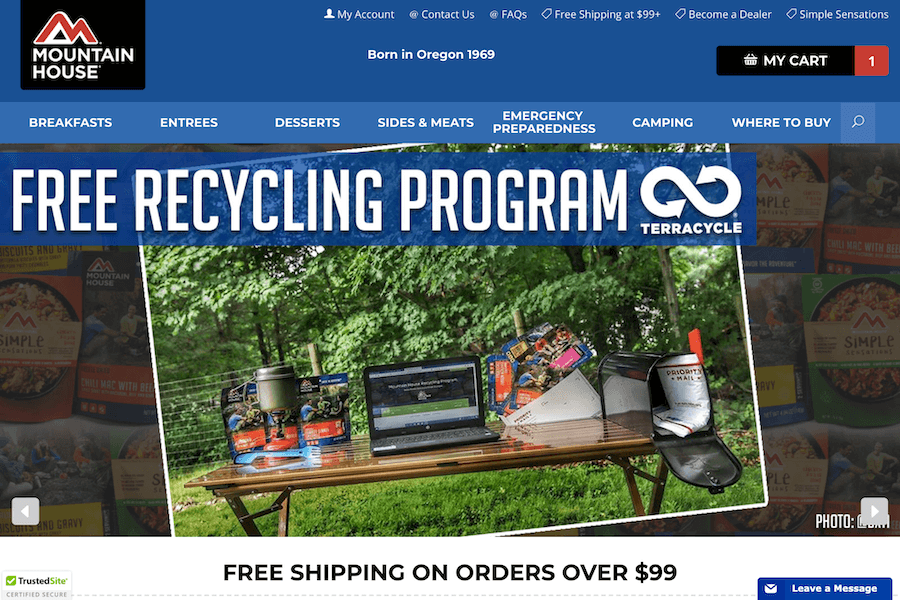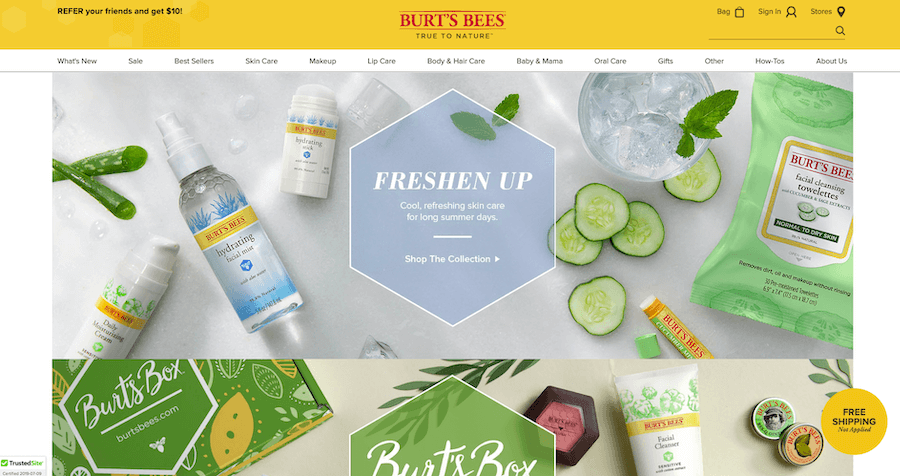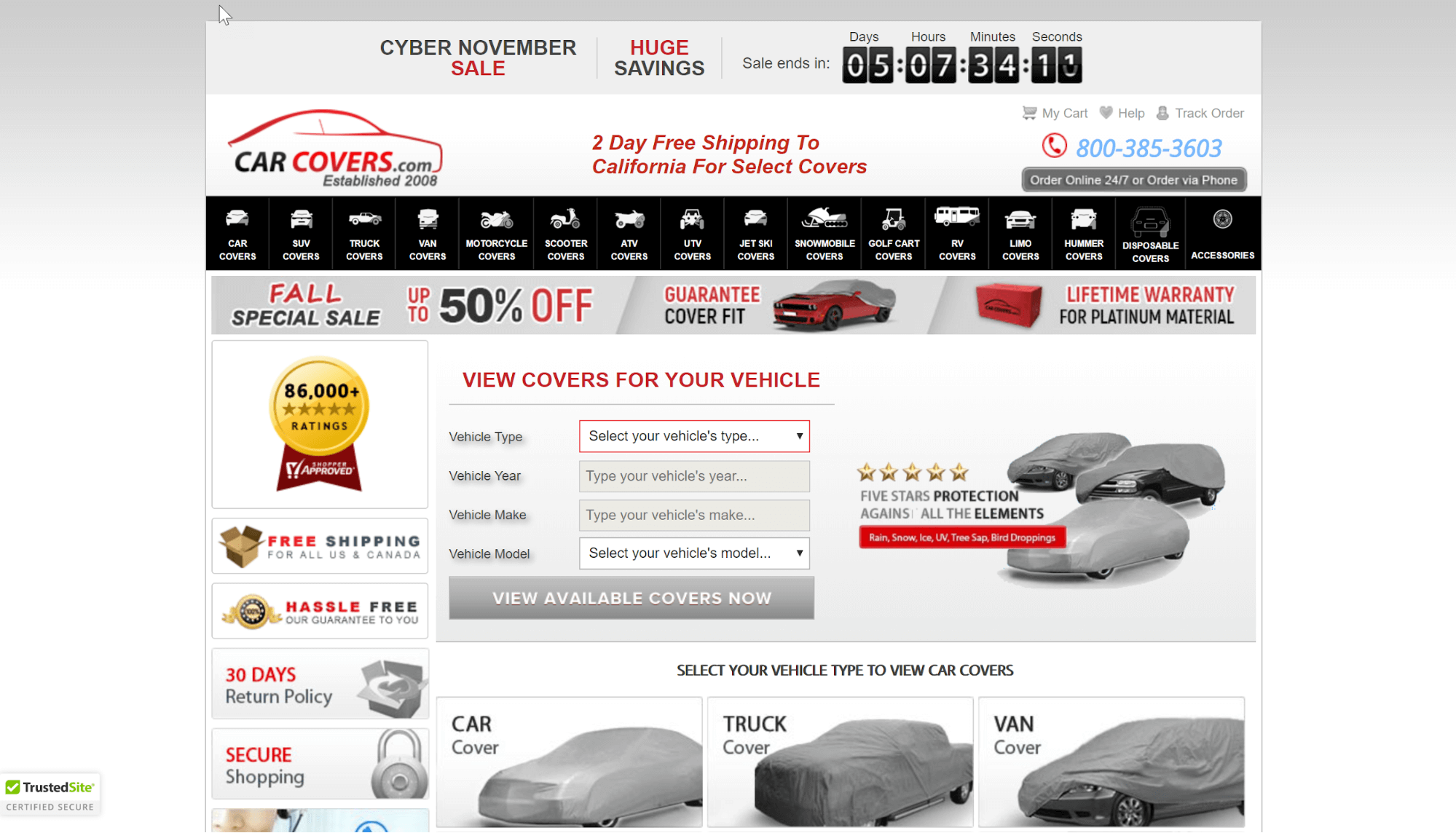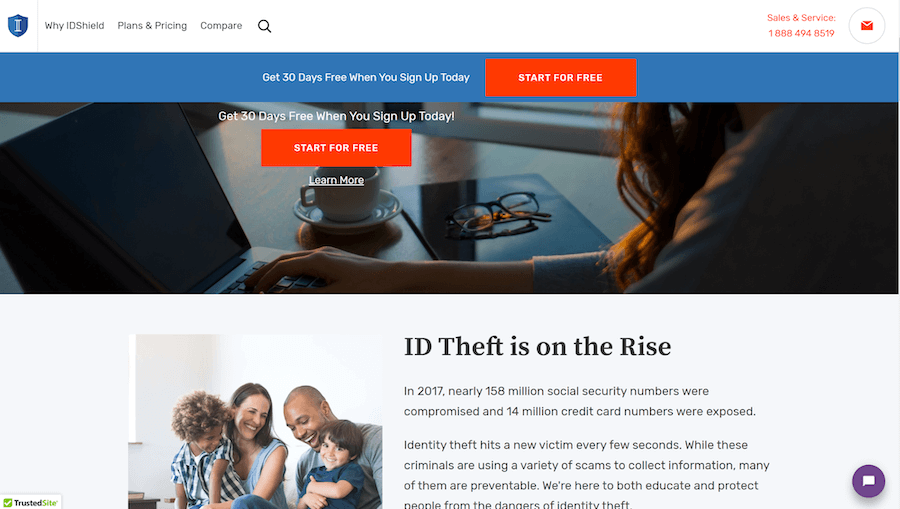We’ve continually tested various trust badges from several 3rd party brands for over a decade as part of our analysis of eCommerce websites.
The two badges that performed the best in our 2018 tests were Norton and McAfee. But in this post, we’ll reveal a brand that achieved a conversion lift above Norton and McAfee in our 2019 testing of trust badges.
Which leads to the question:
What Is the Best Trust Badge for eCommerce?
This year, we tested Norton and McAfee trustmarks against TrustedSite on a handful of our clients’ large-scale eCommerce websites. Those tests repeatedly concluded that TrustedSite was the trustmark most likely to lift conversions on those websites.
While website security badges aren’t the only factor when it comes to trust, (or SEO, or sales) we have seen the conversion rate on our clients’ eCommerce websites improve when a trustmark is present through the customer’s journey on the site. In other words, it’s important to display the trustmark on each webpage — including the homepage, any landing page, the shopping cart, and checkout.
While our tests got the best result from displaying the TrustedSite mark, every website is unique. This same result may not necessarily occur on a different website due to various brand and audience factors. We recommend that every online store add a secure trust badge like TrustedSite to see what happens and test it against other badges.
Note: We’re experts at testing for small adjustments that can increase conversion rates on your eCommerce website. Get in touch with our conversion experts here.
Background: Our 2018 Comparison of Trust Badges
In 2018, we tested a full set of widely-used trust badges on our clients’ eCommerce websites.
These tests were for 3rd-party “security” types of trust badges rather than icons representing things like a money back guarantee or payment badges (such as credit cards, PayPal, or Amazon).
The logos we tested included:
- McAfee SECURE
- Norton Secure
- Authorize.net
- TrustGuard
- Trustwave
- GeoTrust
- BizRate
- BBB (Better Business Bureau)
What we learned: In those tests, we found that several of these widely-used security badges lowered conversions, while some didn’t affect conversions at all. Meanwhile, the “McAfee SECURE” and “Norton Secured” trust badges conclusively increased sales for our clients’ websites.
Once we found that the McAfee and Norton trust logos were the most likely to increase conversions for our clients, we wanted to narrow it down even further to one brand or the other.
McAfee vs Norton
In our tests of McAfee vs. Norton trust badges, McAfee’s trust badge was more likely to increase conversions than Norton’s each time…at least for now.
“Trust” is something that we recommend eCommerce stores work on continuously. What works to build trust today may not work as well later on. The only proof to find out is through testing.
What does this mean in the context of displaying trust badges? Once time passes, it’s time to re-test them and see which trust badges work best.
McAfee vs Norton vs TrustedSite
With this in mind, we tested the Norton and McAfee security logos against TrustedSite. This test made sense as the two best-performing logos we’d tested against a badge we hadn’t yet tested them against.
About these companies: TrustedSite has operated the McAfee SECURE brand since 2013. At the same time, TrustedSite offers certification services and website trust seals under its own brand. Meanwhile, Symantec is the parent company of Norton Secured (and of Digicert, under which Norton Secured is offered).
On the four enterprise eCommerce websites we tested these seals on, TrustedSite repeatedly displayed a conversion lift when pitted against Norton and/or McAfee.
Below are the results of the four tests, followed by a summary of what this testing has taught us about “trust” as it applies to eCommerce today.
Test 1: Freeze Dried Food eCommerce Website
For this test and the other websites we tested, a constant was the TrustedSite seal’s placement floating in the bottom left of the website’s pages. The trust badges appeared on: the homepage, category pages, product pages, the cart page, as well as on the checkout payment step.
For MountainHouse.com, the TrustedSite badge was also displayed on mobile as a sticky floating security badge.

MountainHouse.com was a unique case where we had tested McAfee previously but it was never implemented. This new test was TrustedSite vs. no badge at all.
Results: The TrustedSite badge gave a 38.77% lift to conversion rate* at 99% confidence.
*Note: Controlled test results can sometimes slant dramatically. Conservatively, we may see a 25% lift to conversion rate in real life with the 38.77% lift to conversion rate in this test.
The tests below compare TrustedSite to McAfee and/or Norton.
Test No. 2: Burt’s Bees eCommerce Website
This test was exclusive to McAfee vs. TrustedSite because our control was an existing McAfee trust badge. The full test consisted of:
- Control: Existing McAfee badges
- Variation 1: Replace all existing McAfee badges with TrustedSite badges
- Variation 2: No floating badges, replace cart and checkout badges with TrustedSite badges
- Variation 3: No trust badges

Results: Variation 1 was the winner: replacing all existing McAfee badges with the TrustedSite badge resulted in an increase to the conversion rate of 8.72% at 93% confidence.
Takeaway: All the TrustedSite variations outperformed the control. Plus, all variations using trust badges, TrustedSite and McAfee, outperformed variations that had no trust badges.
We can say with confidence that for Burtsbees.com, visitors prefer to see a trust badge and TrustedSite instills more trust in this audience than McAfee.
Test No. 3: Auto Accessories eCommerce Website
Carcovers.com had previously tested Norton vs McAfee on their website. Norton got more conversions than McAfee in the past test. This new test for CarCovers.com compared TrustedSite vs Norton.

Results: TrustedSite won 2.6% increase to conversion rate at 80% confidence.

Takeaway: Even a small increase in your conversion rate can yield a great ROI from the testing required to get it implemented. While it could seem like a minute change, testing something as small as a trust badge and getting that 2.6% increase assists the bottom line for any business.
Test No. 4: Identity Protection eCommerce Website
Out of these tests, the audience for IDShield.com may very well be the most discerning when it comes to online trust.
The reason being: ID Shield is an identity protection service, and most of their potential customers would be concerned about their online security.

Results: For IDShield.com, TrustedSite won against McAfee with an increase to conversion of 50.5% at 95% confidence.

Takeaway: It can be hard to attribute why one site’s visitors might prefer to see a TrustedSite badge over McAfee. However, through testing, we can confirm with confidence that this is the case for this particular audience at this point in time.
Why Trust Badges Are Still Important for eCommerce
There are four major takeaways we’ve learned about the world of trust:
- Consumers prefer to buy from brands they trust.
- “Trust” is about more than online security and personal information.
- Different trust badges have different levels of consumer trust.
- The best trust badge for eCommerce is revealed through testing.
1. Consumers Prefer to Buy From Brands They Trust
The advancement and availability of creating an eCommerce business has dramatically increased, causing consumers to be exponentially inundated with more offers, emails, and websites that they have no familiarity with.
Meanwhile, the world’s largest corporations are involved in widely-publicized data breaches of their customers’ personal information on a regular basis.
Trust concerns today are about the visitor’s experience and point of view, not just about the brand and its level of establishment with the visitor.
Take Burt’s Bees for example — a large, well-known brand that saw a significant increase in conversions when displaying trustmarks. Brands tend to speak to the level of product trust, not necessarily the online purchase experience on their eCommerce store.
Thus, consumer’s sensitivity around ensuring a site and transaction can be trusted has made the presence of trustmarks more important.
2. “Trust” Is About More Than Online Security and Personal Information
Risks have shifted. What used to be concerns around site security alone, has now moved into eCommerce performance, scam avoidance, business practices, shipping fulfillment, and protection of customer data.
Trust expands from security into:
- Business trust
- Product trust
- Order fulfillment
- Identity protection
Based on the test results and performance we’ve seen, there is still a very real need for trust badges, particularly badges that address multiple areas of business trust in addition to security.
For example, the TrustedSite system of trustmarks addresses both security (scans for malware, viruses, and valid SSL certificates) and trust concerns (verified business information, shopper identity protection, and issue-free orders). A comprehensive trustmark like this is intended to put consumers at ease throughout every step of the online shopping experience.
3. Different Trust Badges Have Different Levels of Consumer Trust
Our tests have shown us that even if security isn’t top-of-mind when customers are about to enter their credit card information on the checkout page, it’s at least back-of-mind.
We know this because:
- The conversion rate was lower in control tests we ran on eCommerce sites without a trust badge displayed.
- Trust badges from lesser-known online security brands can lower conversion rates.
- Trust badges from brands with more widespread recognition are the most likely to increase conversions.
Testing is the ultimate proof of customer concerns. Our recommendation is that sites should be open to testing more well-known and widely used trust badges like TrustedSite, McAfee, and Norton because consumers are more familiar with them and their protection.
4. The Best Trust Badge for an eCommerce Website Is Revealed Through Testing
The tricky thing about “trust” is that it takes shape differently for every eCommerce brand and audience. In comparing trust badges, we’ve learned that different badges vary in their effect on eCommerce conversion rates.
There are multiple factors at play. In addition to the actual logo graphic and messaging the audience sees, the eCommerce brand, its website, and the audience all interact as factors.
Building toward more audience trust is something we learn about and work on continuously by necessity because every website and brand is unique. So the biggest caveat we can give is to run a test on your own website rather than assume you’ll get a similar result to another site’s test.
Test These Badges on Your Own Site
If your business has the means, we recommend starting a test with well-known and trusted brands like Norton, McAfee, and TrustedSite against a control test of no badge at all.
The control test is important: We have conducted tests where a trustmark seemed to raise online shoppers’ security concerns.
You may also consider including more specialized trustmarks that are relevant to your particular industry alongside these general marks.
Note: We can find small changes that lead to big results on your website. Contact our conversion optimization team here.
 from Inflow https://ift.tt/36EEubq
from Inflow https://ift.tt/36EEubq via IFTTT
via IFTTT
No comments:
Post a Comment